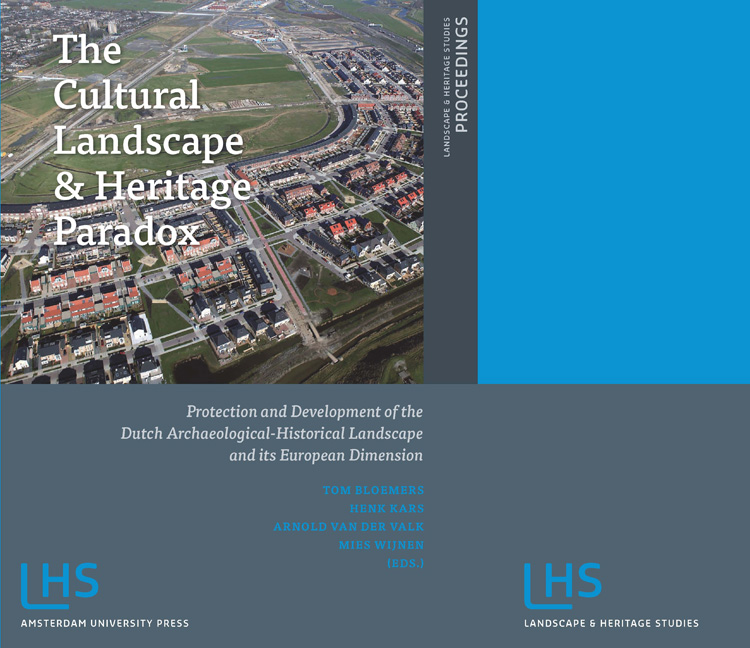 The Cultural Landscape and Heritage Paradox
The Cultural Landscape and Heritage Paradox Book contents
- Frontmatter
- Contents
- Preface
- I INTRODUCTION
- II INSIGHTS AND PROSPECTS OF ARCHAEOLOGICAL-HISTORICAL LANDSCAPE STUDIES
- III LINKING KNOWLEDGE AND ACTION
- IV IMAGINATION - FACTS AND CONSTRUCTIONS
- V SHARING KNOWLEDGE - STORIES, MAPS AND DESIGN
- VI SYNTHESIS AND CONCLUSIONS
- VII MANAGEMENT OF KNOWLEDGE
- VIII AGENDA FOR THE FUTURE
- IX SUMMARY
- X APPENDIX
- Subject Index
- Index of Places and Regions
2 - Heritage Policy in Spatial Planning
Published online by Cambridge University Press: 21 January 2021
- Frontmatter
- Contents
- Preface
- I INTRODUCTION
- II INSIGHTS AND PROSPECTS OF ARCHAEOLOGICAL-HISTORICAL LANDSCAPE STUDIES
- III LINKING KNOWLEDGE AND ACTION
- IV IMAGINATION - FACTS AND CONSTRUCTIONS
- V SHARING KNOWLEDGE - STORIES, MAPS AND DESIGN
- VI SYNTHESIS AND CONCLUSIONS
- VII MANAGEMENT OF KNOWLEDGE
- VIII AGENDA FOR THE FUTURE
- IX SUMMARY
- X APPENDIX
- Subject Index
- Index of Places and Regions
Summary
ABSTRACT
In response to the wave of nostalgia that accompanied the negative public response in the Netherlands to the huge number of infrastructural interventions, city extensions, agricultural concentrations and expanding business areas during the last quarter of the twentieth century, the Belvedere state policy (1999-2009) tried to implement a way to integrate the remembrance, rituals and material remnants of the past in spatial planning programmes.
The state wanted to transform the Netherlands, cope with the international competition and, at the same time, combine this transformation with a policy of reconciling preservation and renewal processes. Alliances between government, institutions, entrepreneurs and the public are indispensable for the realization of such aims, without such problems between owners and clients there would be no spatial planning and public space.
Such a policy also puts high demands on the designing disciplines. Their interventions and inventions could aim at autonomous enclaves within a new environment as a not recognizable or non-segregated element within a modern concept, or as a sublimated actualization of an old spatial or pattern-like arrangement, respectively transformation, recreation or recombination and perhaps even as loose traces and thus as historical references. The designer should also be able to uncover the invisible presence of the past, remixing the historical atmosphere. Thus surprising links may arise between physical and nonphysical dimensions of a place in the sense of cross-overs. The unimaginable can produce a performance.
If the integration of historical remnants in spatial interventions is striven for, then cultural history is to obtain a firm position in the diverse configurations of spatial planning. A programme of knowledge development and knowledge education by means of a research agenda and an education programme is indispensable.
KEY WORDS
Body of knowledge; cultural renewal, education; heritage policy, identity, spatial planning
A CLOUD OF NOSTALGIA
Heritage as experience
The reconstruction of town and countryside in the Netherlands during the last decade was accompanied by ample attention to history and tradition. In full awareness of the risks and the transience in society, texts, images and matter evoked memories of the pretensions and magnificence of the Netherlands created by human hand.
- Type
- Chapter
- Information
- The Cultural Landscape and Heritage ParadoxProtection and Development of the Dutch Archaeological-Historical Landscape and its European Dimension, pp. 641 - 652Publisher: Amsterdam University PressPrint publication year: 2010
- 5
- Cited by


